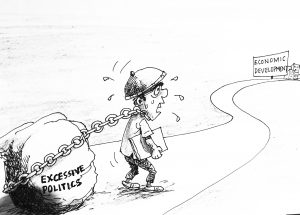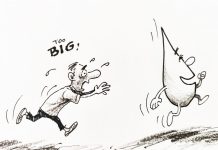Common knowledge holds that excessive political interference and power struggles can undermine a nation’s progress. By examining the impact on policymaking, economic stability, social cohesion, and infrastructure development, it becomes evident that an overabundance of politics can derail a nation’s journey towards sustainable development.
When politics overshadows rational decision-making processes, policymaking becomes mired in power struggles and personal agendas. Political actors may prioritize short-term gains over long-term sustainability, leading to ineffective and inconsistent policies. The constant shifts in political ideologies with each change in leadership can result in the reversal or abandonment of previously established policies, leaving a nation in perpetual state of uncertainty. This continuous cycle hampers the ability to implement systemic changes, foster investment, and address pressing societal challenges, thereby impeding overall development.
Excessive political interference often contributes to economic instability. Frequent changes in regulations, arbitrary tax regimes, and inconsistent enforcement of laws can deter investments and hinder the growth of businesses. Additionally, excessive corruption and bribery, prevalent in politically driven systems, divert fundings from crucial economic sectors, aggravating income inequality. Furthermore, political instability disrupts macroeconomic stability, leading to inflation, currency devaluation, and an increasing burden of debt. These adverse economic consequences hinder a country’s development and deter foreign investors, further exacerbating the cycle of economic decline.
Too much politics also polarizes and divides societies, undermining social cohesion, and impeding development. Political polarization often occurs when political parties or leaders prioritize their own interests over national unity. This leads to the fragmentation of societies along various fault lines, exacerbating social tensions, and potentially fueling violence or civil unrest. When political conflict takes center stage, it distracts government attention and resources from addressing critical socio-economic issues such as poverty, education, healthcare, and social welfare. The resulting societal divisions can further impede progress by hindering cooperative efforts and eroding trust in national institutions.
Infrastructure projects, such as roads, bridges, power plants, and public transportation, often require long-term planning and stability to ensure successful completion and proper maintenance. But excessive politics can lead to delays, corruption, and mismanagement, stifling progress and frustrating citizens. A lack of reliable infrastructure inhibits economic growth, restricts access to basic services, and limits opportunities for the population, further hindering a country’s development. Take the worst condition of Maharlika Highway in Samar, for a classic example.
Indeed, excessive politics negatively impacts various aspects of our nation’s development. To ensure sustainable development, it is crucial for our country to prioritize rational decision-making processes, promote stability, and foster cooperation among political stakeholders, while simultaneously addressing critical socio-economic challenges.




